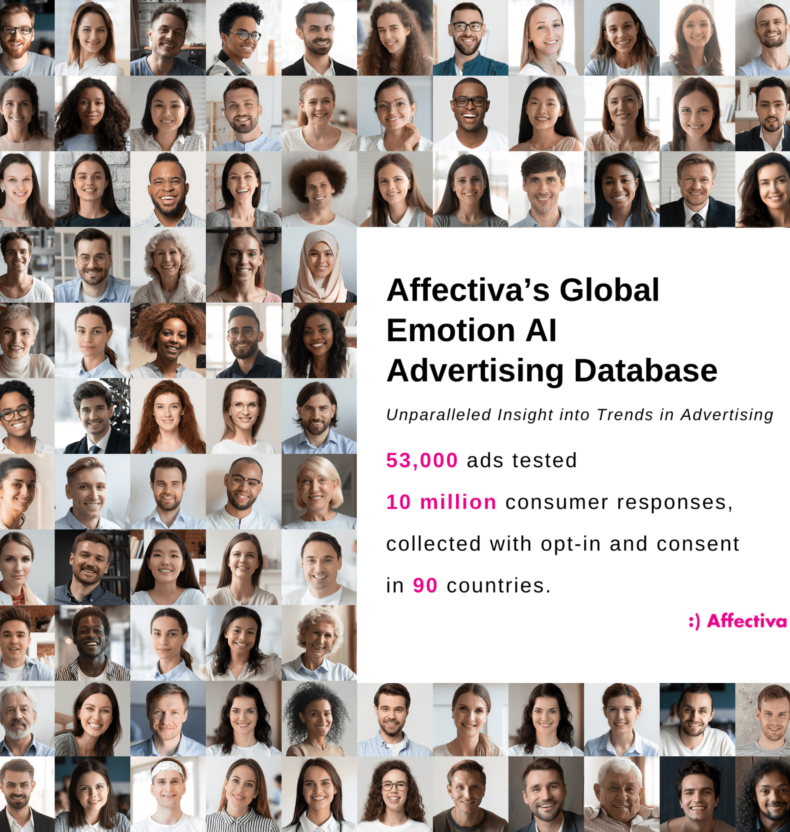
Analysis of engagement with 53,000 ads shows a rise in negative emotions, suggesting advertisers need to dig deeper on positive emotional content, especially during the pandemic
Boston, MA – October 27, 2020 – Affectiva, the global leader in Emotion AI, today announced findings on consumers’ emotional engagement with ad content over the last eight years, which show that advertisers are increasingly pulling on people’s heartstrings to generate a response. The analysis reveals that advertisers are becoming more effective at eliciting emotional responses – both positive and negative – from consumers, with a trend toward invoking more sadness and polarized emotions. Many ads referencing the COVID-19 pandemic this year have shown this pattern.
Over the last decade, advertisers have increasingly focused on creating emotionally resonant ad content, with the knowledge that emotions are a key predictor of sales and brand loyalty. Affectiva’s analysis uncovers the effectiveness and shortcomings of these efforts, providing unique insights for brands based on the company’s emotion database. This first-of-its-kind emotion database consists of data on 10 million consumer responses to more than 53,000 ads in 90 countries, collected over the last eight years. The data was collected through Affectiva’s Media Analytics software, which uses artificial intelligence to detect nuanced emotional reactions and complex cognitive states from the facial expressions of market research participants when they view ad content.
Key findings from the analysis include:
- There is an overall increase in emotional responses to ads, indicating that advertisers have become better at telling emotionally powerful stories.
- There is a trend toward more negative reactions. Globally, viewers of an ad are now slightly more likely to show negative reactions like brow furrows or downturned mouths, than they are to show positive expressions like a smile. In some cases, negative emotions like sadness can still result in meaningful engagement and sales; but, the analysis suggests advertisers should do more to positively engage audiences.
- 2020 has reinforced these trends in emotional advertising and ad preferences, in the wake of the pandemic specifically. Consumers respond positively to ads acknowledging the crisis if they provide tangible help; however, there is a more negative reaction when brands reference the crisis in generalities, without concrete action. In most cases, consumers still respond well to “business as usual” and humorous ads, rather than pandemic content.
- Consumers’ reactions to ads have become more polarized. The range of responses to ads has become wider, with an increasing gap between highly positive and highly negative reactions to the same content. This may reflect the increasingly polarized viewpoints seen across other spheres of society in recent years.
- A happy ad doesn’t mean a happy viewer. Actors in advertising are more likely to smile than to show any other expression, but viewers are far less likely to smile in response. Positive engagement comes from developing powerful narratives that resonate with the audience.
“The pandemic has prompted brands to rethink their advertising strategy; but, we’ve found that cultivating positive emotional engagement in ads is often the best approach, both for business impact and for serving up the content that consumers are craving,” said Dr. Rana el Kaliouby, co-founder and CEO of Affectiva. “If brands can help people deal with the pandemic, it makes sense to share that news, but advertisers should also remember that COVID has left today’s audiences fatigued, so in the absence of concrete help, dwelling on the pandemic may not be the best route forward. Brands have a unique opportunity to provide an escape from these issues, and we’re seeing that continue to have impact.”
“From our work with 70 percent of the world’s largest advertisers and 28 percent of the Fortune Global 500 companies, we’ve found that emotionally resonant ads improve sales results,” said Graham Page, Global Managing Director, Media Analytics at Affectiva. “Engaging viewers’ emotions drives attention, memory and can shape brand perceptions and business outcomes positively. Specifically, we’ve seen that generating positive feelings is associated with stronger sales effects, so the drift towards more negative engagement is worrying. Advertisers should consider how they can tell stories in which their brand generates a positive outcome.”
Affectiva is hosting a virtual event on Tuesday, November 17 to discuss the findings of the report and the key takeaways for brands. Register online here.
Visit us online for more information about Affectiva’s work with media analytics.
About Affectiva
Affectiva is on a mission to humanize technology. An MIT Media Lab spin-off, Affectiva created and defined the Emotion AI category. Built on deep learning, computer vision, speech science and massive amounts of real-world data, Affectiva’s technology can detect nuanced human emotions, complex cognitive states, activities, interactions and objects people use. Today, 70 percent of the world’s largest advertisers, 28 percent of the Fortune Global 500 companies and leading research firms such as Kantar, are using Affectiva’s technology to test the unbiased and unfiltered emotional responses that consumers have with brand content such as TV programming. Affectiva has the largest emotional database in the world, with 10 million consumer responses to more than 53,000 ads in 90 countries.
For more information, visit www.affectiva.com or follow on Twitter, Facebook, Instagram and LinkedIn.
Contact
March Communications
Hailey Melamut, +1 617-960-9856
affectiva@marchcomms.com